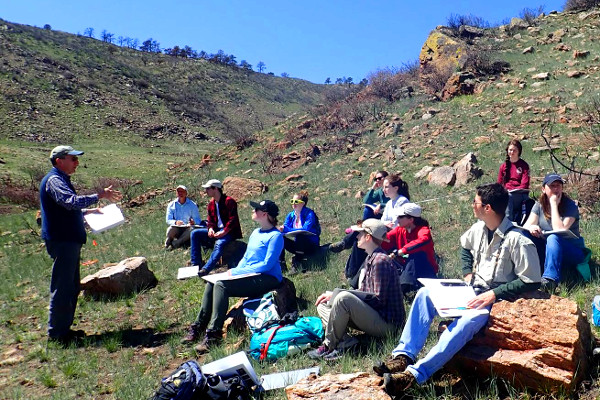Core Methodology Training, or CMT, is a hands-on introduction to standards, methods, and tools that are "core" to the success of the NatureServe Network. The training supports the consistent use of these standards and methods, and facilitates a sense of camaraderie across the Network. It also provides a forum for discussion of how well our methodologies are working locally, supporting their ongoing evolution.
View NatureServe's Core Standards and Methods documents.
CMT 2019 included three full days of training on Tuesday-Thursday, April 23-25, and optional 1/2 day sessions on Friday, April 26. The first three days included the following topics and activities.
- Overview of the NatureServe Network
- Summary of how the NatureServe Network is guiding conservation decision-making
- Beyond Core Methods: How the Network is integrating maps, observation data, and modeling
- NatureServe Network's challenges and opportunities in biodiversity conservation
- Interactive overview of the NatureServe Network Methodology
- Field trip to collect data, and gain an understanding of what type of information is important for creating EO records
- Biotics hands-on mapping exercises
- Element Occurrence (EO) status assessment (EO Ranking) exercises
- Element Conservation Status Ranking (Global and Subnational Ranking) exercises using the Rank Calculator
- Opportunities to get to know NatureServe staff and other members of the Network
The three optional sessions available on Friday, April 26 are described below and were held simultaneously from 8am-12noon.
• Biotics Optional Training: Trainees were polled prior to the training to identify Biotics-related training needs. By default, hands-on training on SQL (queries, inserts, updates) and bulk uploading in Biotics 5 was covered, this was adjusted according to trainee poll responses. The training was a hands-on training led by Whitney Weber (NatureServe DBA & Product Support Specialist) and Danielle Kulas (Virginia Natural Heritage Program Biodiversity Data and GIS Specialist).
• Ecology Program Optional Training: An overview of the Ecology program at NatureServe was provided, and, based on input from trainees ahead of time, a discussion of identified topics was facilitated. Pat Comer (NatureServe Chief Ecologist), lead this session.
• Species Science Program Optional Training: A brief summary of tools and communication avenues available to network botanists and zoologists was provided followed by a discussion of trainees’ questions and conundrums submitted prior to the session. Bruce Young (NatureServe Chief Zoologist and Senior Conservation Scientist) lead this session.
2018 Core Methodology Training Field Session at Coyote Ridge, Colorado
Should I Attend?
We recommend attending CMT if you are a recent addition to the NatureServe Network, have never taken methodology training before, took methodology training more than five years ago, or are a partner organization working with the NatureServe Network and want to learn more about the core methods that are being used. Since NatureServe methodologies are always evolving, and the training has evolved to be more hands-on and interactive, most NatureServe Network staff, members, and partners will benefit from attending this training.
Trainers
Core Training Team
- Shara Howie, NatureServe, Program Manager
- Don Faber-Langendoen, NatureServe, Senior Ecologist, Northeastern North America
- Whitney Weber, NatureServe, DBA & Product Support Specialist
- Wes Knapp, NC Natural Heritage Program, Western Regional Ecologist/Botanist
- Danielle Kulas, Virginia Natural Heritage Program, Biodiversity Data and GIS Specialist
- Chris Ludwig, Virginia Natural Heritage Program, Chief Biologist
Other Trainers
- Sean O’Brien, NatureServe, President & CEO
- Allison Gratz, NatureServe, Director of Network Relations
- Lori Scott, NatureServe, Chief Information Officer
- Pat Comer, NatureServe, Chief Ecologist
- Anne Frances, NatureServe, Lead Botanist
- Amanda Treher, NatureServe, Research Botanist
- Bruce Young, NatureServe, Chief Zoologist and Senior Conservation Scientist
- Healy Hamilton, NatureServe, Chief Scientist
- Regan Lyons Smyth, Spatial Ecology Project Manager
I really enjoyed the training! It gave me a sense of why I chose this job and a bigger picture of the NatureServe community and how it benefits species and habitat conservation. I think everyone in this field should attend the training at least once so they can appreciate and understand the standardized, science-based methodology that NatureServe offers to programs on an international scale.
-Stephanie Shelton, Texas Parks and Wildlife Department.

